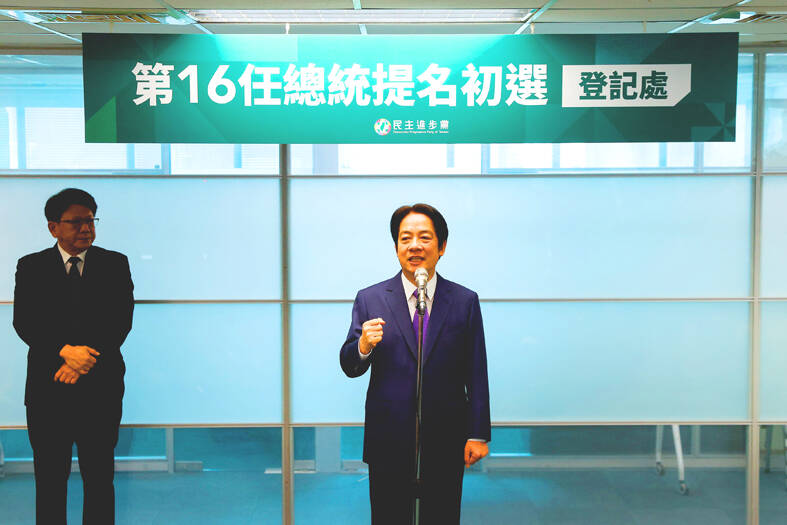Vice President William Lai (賴清德) yesterday said that he would strive to ensure Taiwan’s security in the face of increasing Chinese threats, shortly after registering to run in the Democratic Progressive Party’s (DPP) presidential primary.
Lai, who is DPP chairman, completed his registration at the party’s headquarters in the company of former Pingtung County commissioner Pan Men-an (潘孟安).
Registration to run in the DPP’s primary is open until tomorrow.

Photo: Ann Wang, Reuters
Lai told reporters after registering that he was “extremely determined” to run for the country’s top job on the DPP ticket and urged Taiwanese to give him an opportunity to lead the country.
“We must be united to strengthen Taiwan, stick to the democratic camp and ensure Taiwan’s security” in the face of increased Chinese “saber rattling” and “unscrupulous diplomatic bullying,” Lai said.
Lai, 63, added that he would strive to bring the nation’s people together to expand the economy, safeguard democracy, bolster national defense and ensure peace in Taiwan.
His comments came hours after Honduran President Xiomara Castro said her government would begin planning for the “opening of official relations with the People’s Republic of China.”
Asked about the matter, Lai, who held a meeting with Castro in Tegucigalpa in January last year shortly after she was sworn into office, gave no response.
In addition to talking tough on China, Lai also said he would seek to bring prosperity to Taiwan by rolling out development projects, boosting the economy and fighting organized crime.
He would lead the country through challenges, including achieving its net zero emissions targets, mitigating the impact of the war in Ukraine and restructuring supply chains, he said.
From Taiwan’s opposition parties, Taiwan People’s Party Chairman Ko Wen-je (柯文哲) and New Party cofounder Wang Chien-shien (王建?) have announced their intention to run for president.
Chinese Nationalist Party (KMT) member Chang Ya-chung (張亞中) has announced his intention to run, but the party has yet to decide whether it would hold a primary.
Chinese-language media have reported that New Taipei City Mayor Hou You-yi (侯友宜), Hon Hai Precision Industry Co (鴻海精密) founder Terry Gou (郭台銘) and KMT Chairman Eric Chu (朱立倫) are seeking the KMT’s nomination.
The election is scheduled for Jan. 13 next year.

CHAOS: Iranians took to the streets playing celebratory music after reports of Khamenei’s death on Saturday, while mourners also gathered in Tehran yesterday Iranian Supreme Leader Ayatollah Ali Khamenei was killed in a major attack on Iran launched by Israel and the US, throwing the future of the Islamic republic into doubt and raising the risk of regional instability. Iranian state television and the state-run IRNA news agency announced the 86-year-old’s death early yesterday. US President Donald Trump said it gave Iranians their “greatest chance” to “take back” their country. The announcements came after a joint US and Israeli aerial bombardment that targeted Iranian military and governmental sites. Trump said the “heavy and pinpoint bombing” would continue through the week or as long

TRUST: The KMT said it respected the US’ timing and considerations, and hoped it would continue to honor its commitments to helping Taiwan bolster its defenses and deterrence US President Donald Trump is delaying a multibillion-dollar arms sale to Taiwan to ensure his visit to Beijing is successful, a New York Times report said. The weapons sales package has stalled in the US Department of State, the report said, citing US officials it did not identify. The White House has told agencies not to push forward ahead of Trump’s meeting with Chinese President Xi Jinping (習近平), it said. The two last month held a phone call to discuss trade and geopolitical flashpoints ahead of the summit. Xi raised the Taiwan issue and urged the US to handle arms sales to

BIG SPENDERS: Foreign investors bought the most Taiwan equities since 2005, signaling confidence that an AI boom would continue to benefit chipmakers Taiwan Semiconductor Manufacturing Co’s (TSMC, 台積電) market capitalization swelled to US$2 trillion for the first time following a 4.25 percent rally in its American depositary receipts (ADR) overnight, putting the world’s biggest contract chipmaker sixth on the list of the world’s biggest companies by market capitalization, just behind Amazon.com Inc. The site CompaniesMarketcap.com ranked TSMC ahead of Saudi Aramco and Meta Platforms Inc. The Taiwanese company’s ADRs on Tuesday surged to US$385.75 on the New York Stock Exchange, as strong demand for artificial intelligence (AI) applications led to chip supply constraints and boost revenue growth to record-breaking levels. Each TSMC ADR represents

Pro-democracy media tycoon Jimmy Lai’s (黎智英) fraud conviction and prison sentence were yesterday overturned by a Hong Kong court, in a surprise legal decision that comes soon after Lai was jailed for 20 years on a separate national security charge. Judges Jeremy Poon (潘兆初), Anthea Pang (彭寶琴) and Derek Pang (彭偉昌) said in the judgement that they allowed the appeal from Lai, and another defendant in the case, to proceed, as a lower court judge had “erred.” “The Court of Appeal gave them leave to appeal against their conviction, allowed their appeals, quashed the convictions and set aside the sentences,” the judges